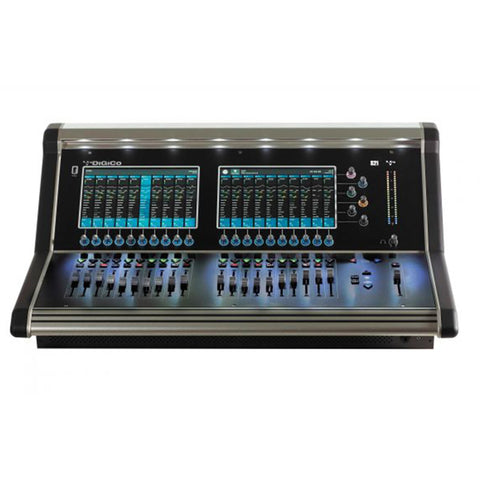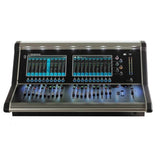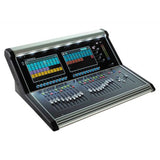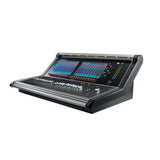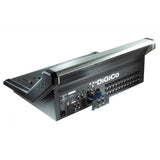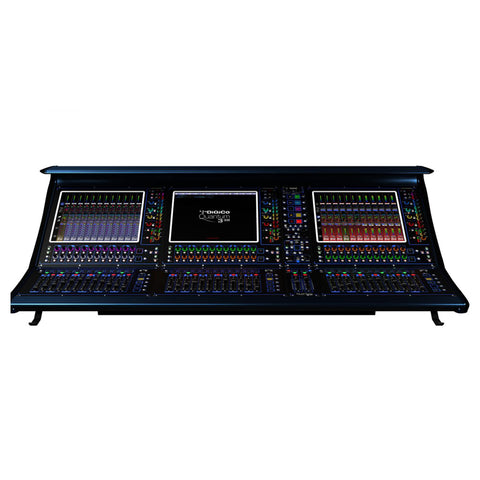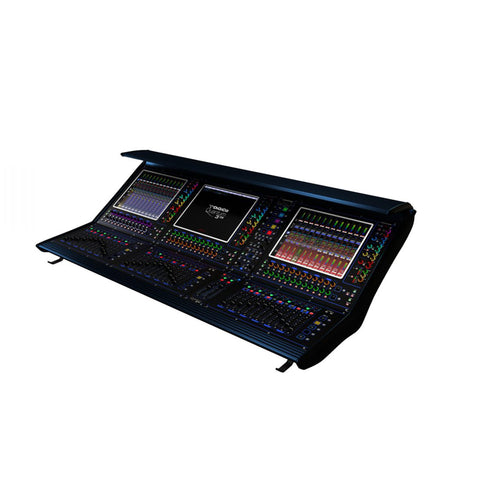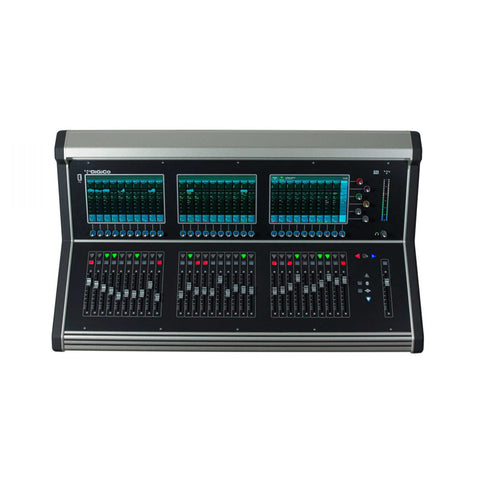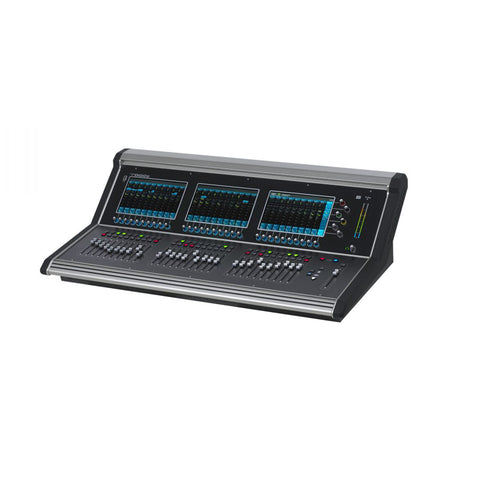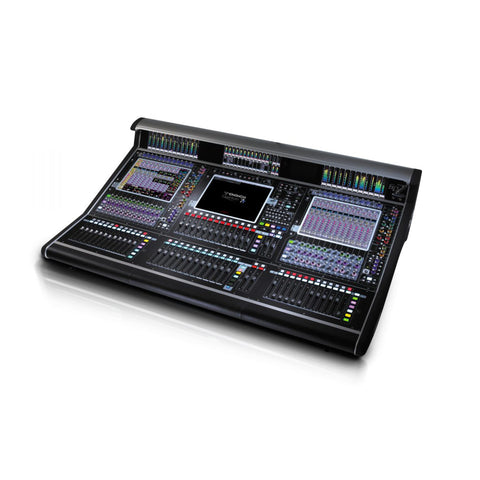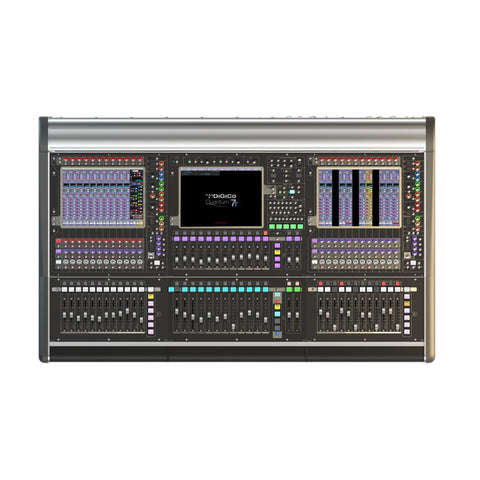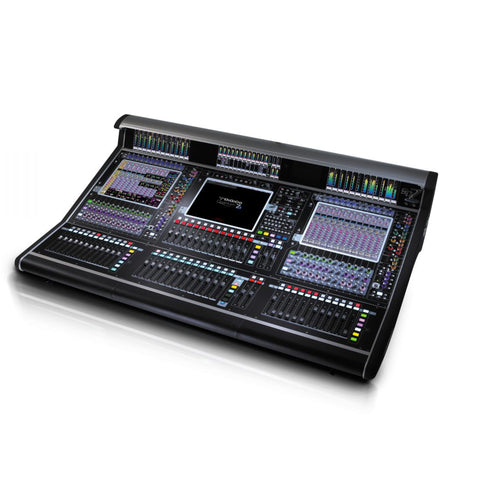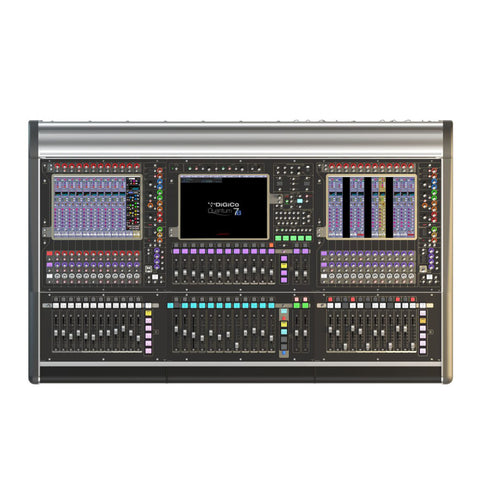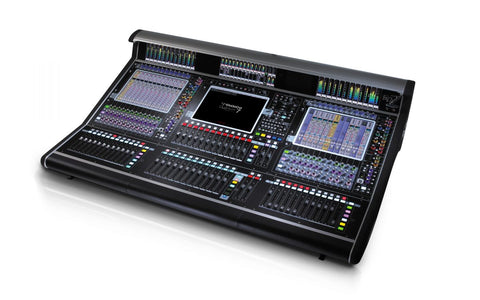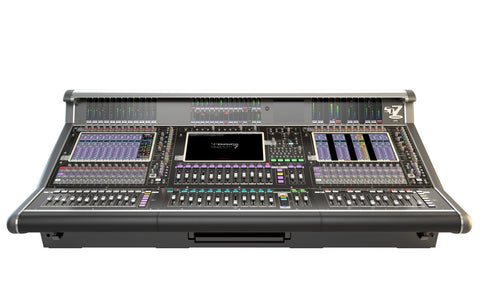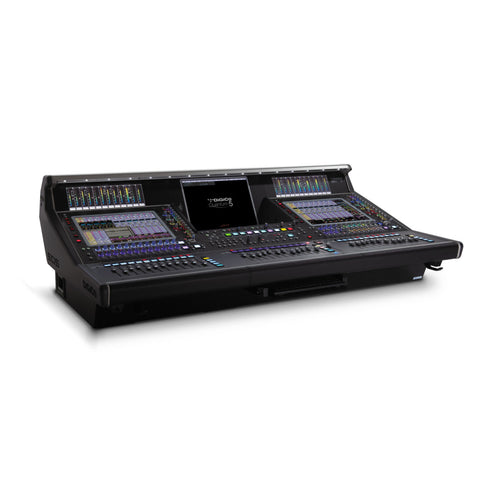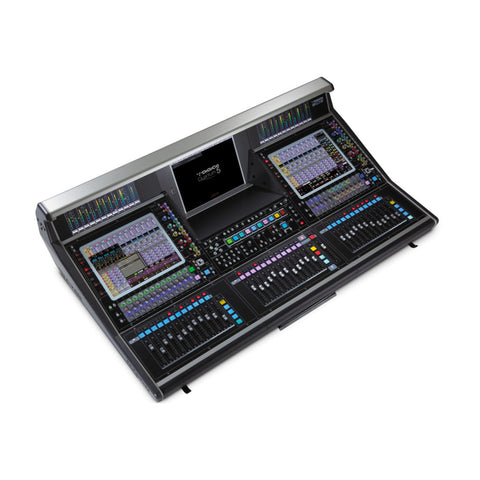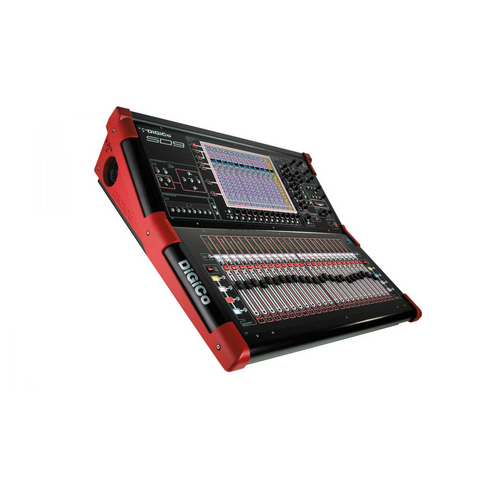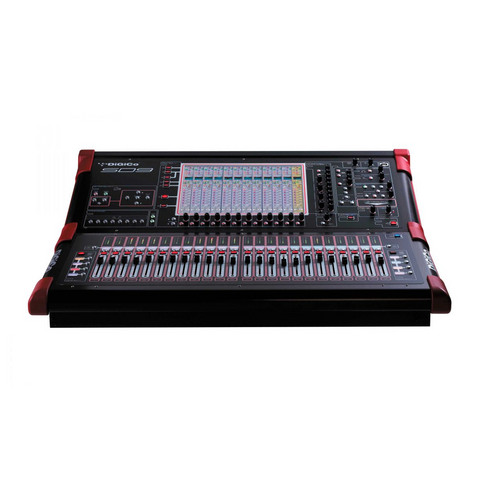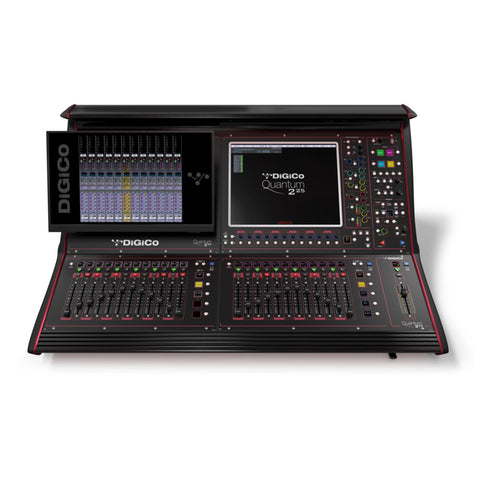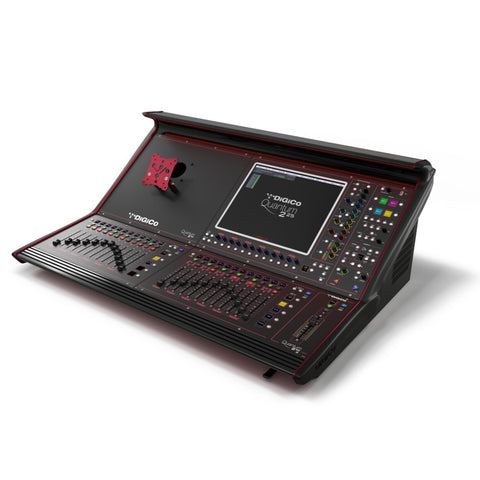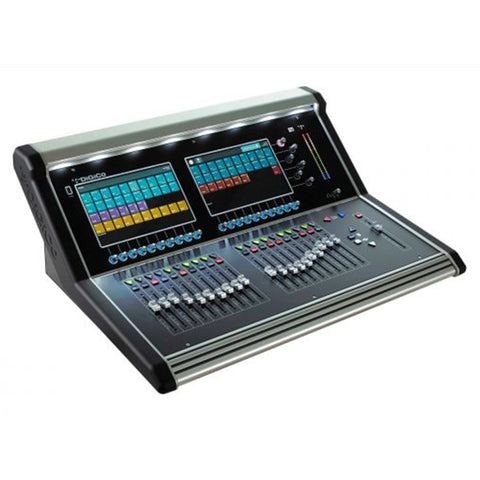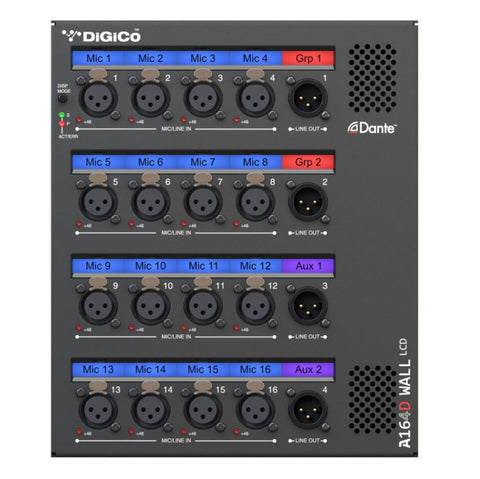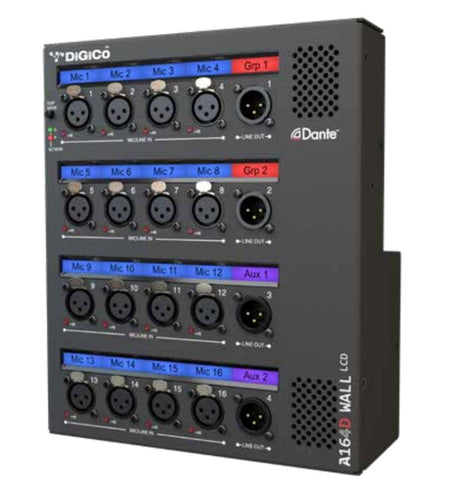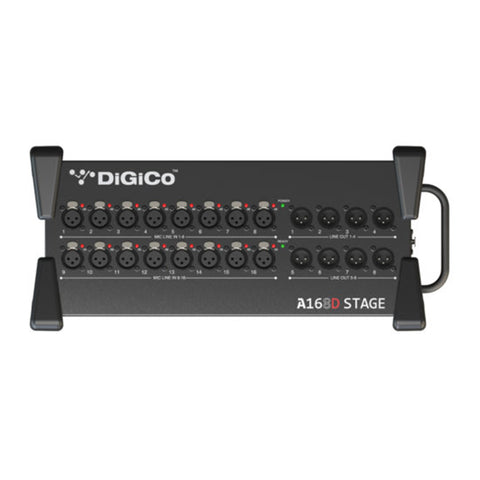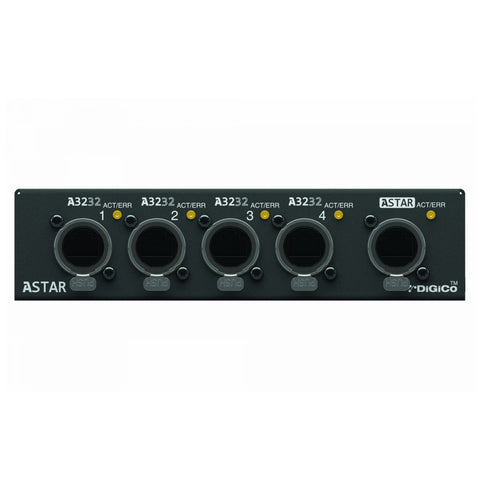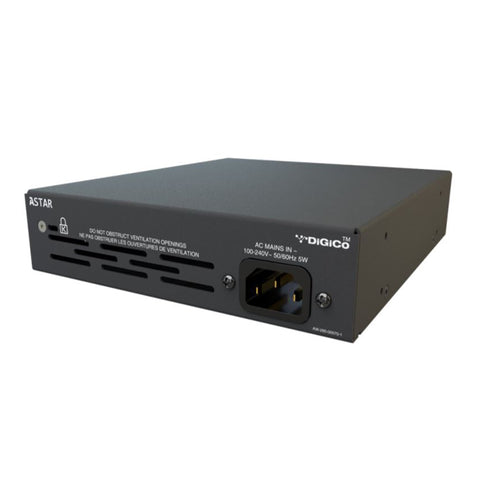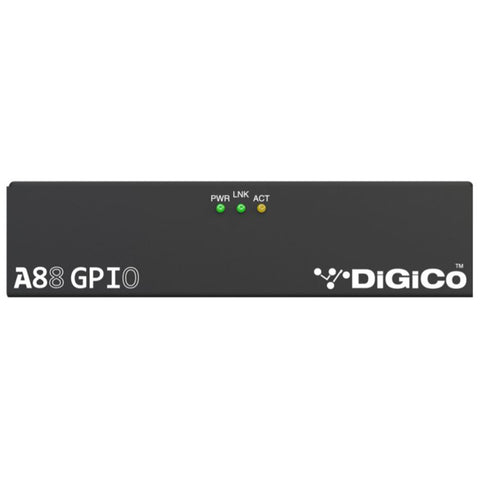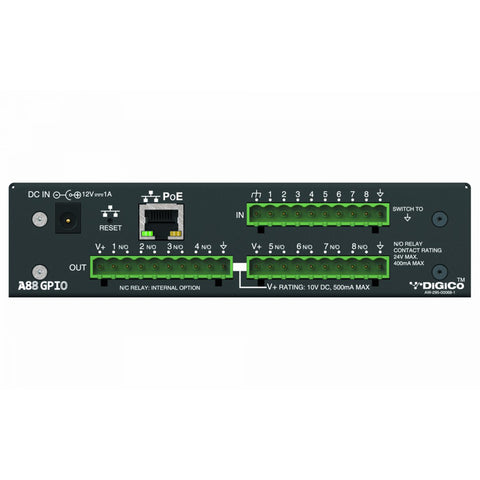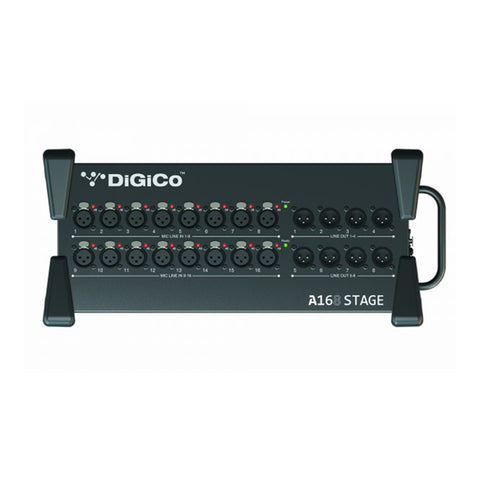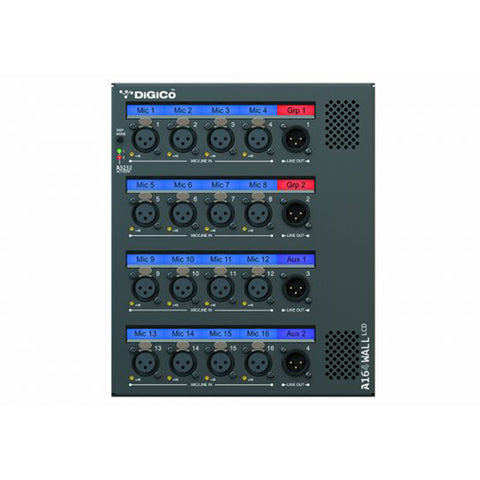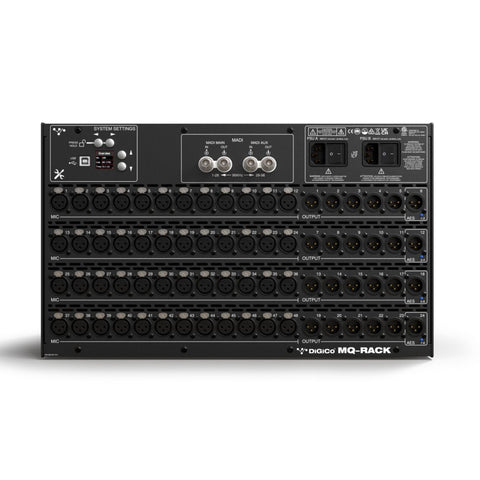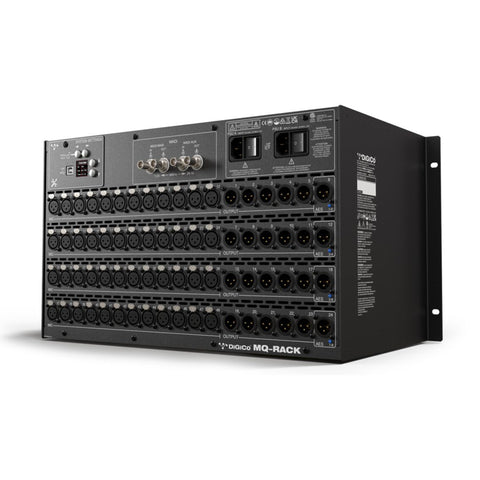DiGiCo S21 DIGITAL MIXING CONSOLE
Vendor: DiGiCo
Unavailable

DiGiCo S21 DIGITAL MIXING CONSOLE
DiGiCo’s world-renowned innovation, deep feature-set, and flagship audio quality of our high-end digital consoles are within reach of everyone. How? Meet the DiGiCo S21 – a world-class DiGiCo mixing console at an astonishing price. Step up to the S21’s work surface, complete with dual P-CAP multi-touch screens, 48 Flexi-channels, the equivalent of 46 buses, and benchmark 96kHz performance, and this console’s heritage is clear – the DiGiCo S21 is every inch a DiGiCo desk. It’s also a revelation in terms of what an introductory digital console can deliver. Based on the same pioneering design approach as the industry-leading SD series, the DiGiCo S21 boasts the same proprietary audio algorithms plus a new ARM QuadCore RISC processor which runs in harmony with the FPGA core. The result is faster processing with lower power consumption, all packaged in the workflow that the industry’s most respected engineers rely upon – now available to everyone.
UNDER THE HOOD
Familiar to the touch and built for the road, the DiGiCo S21 offers to mix without limits. The integration of a high-power QuadCore SoC with high bandwidth memory, a low power 484-ball array FPGA, and a fourth-generation control SHARC DSP offers unprecedented power today as well as the potential for a future processing upgrade path. The compact footprint of the DiGiCo S21 has no relationship to the scale of processing power going on under the polycarbonate worksurface. The two touchscreens each provide 10 channel strips, giving not only clear visual feedback and control of 20 simultaneous channels for a single user but also the possibility when mixing large shows for more than one operator to take advantage of the newly designed drag, swipe, and drop feature that simplifies custom fader layouts. Visual feedback is further reinforced by the HTL (Hidden Till Lit) functionality of the encoder rings, while parameters currently not in use are automatically greyed out, always drawing your attention to the right controls. The dual-screen concept aims to aid the new user learning curve and remove distractions by not only giving you more channels to view at any one time but also allowing one screen to be used as a setup or master whilst the other is utilized for operation. Both touchscreens are responsive to EQ shaping, with fine-tuning available via the tactile and intuitive rotary encoders. Altering the Channel Bank layout, and mixing and matching any channel, aux, group, control group, or matrix within a bank is easily accomplished by drag and drop at the touch of a screen.
I/O
The DiGiCo S21’s local I/O section includes 24 mic/line inputs, 12 line outs, two mono AES/EBU, and two DMI (DiGiCo Multichannel Interface) card slots which interface to standard industry formats such as Analogue, MADI, Dante, Waves SoundGrid, or Calrec’s Hydra 2 Network. The console connects seamlessly with the DiGiCo remote I/O D-Rack providing an additional 32 inputs and up to 16 outputs. Get instant access to 32 fully integrated low-latency Waves stereo MultiRacks, each with up to eight plug-ins per rack, by fitting the DiGiCo SoundGrid DMI card linked to external SoundGrid or DiGiGrid servers, giving a total of 128 additional I/O.
DiGiCo S21 MAIN FEATURES
- 48 Flexi Input Channels (mono/stereo)
- 16 Flexi Aux / Sub-Group Busses (mono/stereo)
- 10 x 8 Matrix with full processing
- Fully assignable channel layout
- 24 local mic/line inputs and 12 line outputs
- 2 DMI slots to expand the I/O as desired
- Snapshots for seamlessly changing many parameters at once
- Offline software
- iPad control
- Compatible with the DMI-AMM for automatic microphone mixing
- OSC control of snapshots
General Specifications
- 48 x Input flex-channels Mono/Stereo (equivalent of 96 DSP channels)
- 46 busses: 16 x Flexi-busses Mono/Stereo (the equivalent of 32 DSP busses), Stereo Master (2), Solo busses (2 stereos, 4 total), and 10 x 8 Matrix (8)
- 10 x Control Groups
- 1 x Compressor per channel and buss
- 1 x Gate per channel and buss (switchable to ducker, or compressor with side chain access)
- 16 x assignable 32 band Graphic EQs
- 8 x FX engines (reverbs, delays, w/modulation, and enhancer)
- 21 x assignable DiGiTuBes
- 21 x assignable Multiband Compressors
- 21 x assignable Dynamic EQ’s
- User-definable Macros
- An extremely high power headphone amplifier with 1/4 inch and mini jack socket
- 96kHz as standard
- 24 mic/line inputs
- 12 analog outs
- 2 AES/EBU I/O (mono)
- Word Clock I/O
- 1 GPI and 1 GPO
- DVI out (for an external monitor)
- 2 DMI Card slots (up to 64 I/O per slot)
- 2 Ethernet connections for Networking
- 2 x 24 segment master/solo meters
- Touch-sensitive rotaries with integrated switch & HTL
- 2 x multi-touch screens
- 21 x touch-sensitive moving faders
- 4 x layers of banks of 10 faders
- Customizable bank and channel layout
- Snapshots
- Integrated USB2 Audio I/O interface for recording and playback of up to 48 channels
Audio Specification
- Sample Rate 48kHz, 96kHz
- Processing Delay 2ms Typical @ 48k (48 Stereo Channels, Stage Input Through L-R Buss to Stage Output) 1.1ms @ 96kHz
- Internal Processing Up to 40-bit, Floating Point
- A>D & D>A 24-bit Converter Bit Depth
- Frequency Response +/- 0.6dB (20Hz – 20kHz)
- THD <0.05% @ Unity Gain, 10dB Input @ 1kHz
- Channel Separation Better Than 90dB (40Hz – 15kHz)
- Residual Output <90dBu Typical
- Noise (20Hz – 20kHz)
- Microphone Input Better Than -126dB Equivalent Noise
- Maximum Output Level +22dBu
- Maximum Input Level +22dBu
Processing Channel Specification
Input Channel
- Input Name: User-Defined
- Channel Selection: Mono / Stereo
- Input Routing: Main Input
- Analogue Gain: -20 to +60dB
- Phase: Normal / Reverse
- Digital Trim: 40 to +40dB
- Delay: 0 – 682ms
- DiGiTuBe Drive: 0.01 – 50.0
- Bias: 0 – 6
- LPF: 20 – 20kHz, 24dB/Oct
- HPF: 20 – 20kHz, 24dB/Oct
- Insert A: (Pre EQ/Dyn) On/Off
- Equalization 4 Band EQ: Parametric or Dynamic (Low/Lowshelf, Lower-Mid/Lowshelf, Upper-Mid/Hishelf, Hi/Hi shelf)
On/Off
Freq; 20 – 20kHz
Gain; +/- 18dB
Q: 0.1 -20 (Parametric) / 0.10-0.90 (Shelf) - Dynamics 1: Single or 4 x Multiband (3-Band)
Compressor; On/Off
Threshold; -60 – 0dB
Attack; 500us – 100ms
Release; 5ms – 5s
Ratio; 1:1 – 50:1
Gain; 0 to +40dB
Hi Crossover; 20Hz – 20kHz
Lo Crossover; 20Hz – 20kHz
Knee; Hard, Med, Soft - Dynamics 2: On/Off
Gate / Ducker Threshold; -60 – 0dB
Attack; 50us – 100ms
Hold; 2ms – 2s
Release; 5ms – 5s
Range; 0 – 90dB
Key; Any Source
Key Listen
Freq/Width; 20 – 20kHz
Compressor; On/Off
Threshold; -60 – 0dB
Attack; 500us – 100ms
Release; 5ms – 5s
Ratio; 1:1 – 50:1
Gain; 0 to +40dB
Link; Any Channel / Buss
S/C Source: Any Source
S/C Listen: On/Off
S/C Filter Freq/Width: 20Hz – 20kHz - Insert B: (Post EQ/Dyn) On/Off
- Mute: Channel Mute
- Solo: Solo Buss 1 / Solo Buss 2 / Both,
- Channel Safe: Socket Properties, Input Route, Mono/Stereo, Label, Filters, Trim, Delay, Tube, Insert A, EQ, Dyn1, Dyn2, Insert B, Aux, Group Assigns, Pan, Fade, Mute, Direct Outs, Full Safe
- Output: Routing Buss,
- Insert A, Insert B,
- Direct: Post-Fade
- Fader: 100mm Motorised Fader ∞ to +10dB
Processing Channel Specification
Aux / Group / Matrix Output
- Name: User-Defined
- Phase: Normal / Reverse
- Digital Trim: -40 to +40dB
- Delay: 0 – 682ms
- DiGiTuBe Drive: 0.01 – 50.0 Bias 0 – 6
- LPF: 20 – 20kHz, 24dB / Oct
- HPF: 20 – 20kHz, 24dB / Oct
- Insert A: (Pre EQ/Dyn) On/Off
- Equalization 4 Band EQ: Parametric or Dynamic (Low/Lowshelf, Lower-Mid/Lowshelf, Upper-Mid/Hishelf, Hi/Hi shelf)
On/Off
Freq; 20 – 20kHz
Gain; +/- 18dB
Q: 0.1 -20 (Parametric) / 0.10-0.90 (Shelf) - Dynamics 1: Single or 4 x Multiband (3-band)
Compressor; On/Off
Threshold; -60 – 0dB
Attack; 500us – 100ms
Release; 5ms – 5s
Ratio; 1:1 – 50:1
Gain; 0 to +40dB
Hi Crossover; 20Hz – 20kHz
Lo Crossover; 20Hz – 20kHz
Knee; Hard, Med, Soft - Gate / Ducker Threshold; -60 – 0dB
Attack; 50us – 100ms
Hold; 2ms – 2s
Release; 5ms – 5s
Range; 0 – 90dB
Key; Any Source
Key Listen
Freq/Width; 20 – 20kHz
Compressor On/Off
Threshold; -60 – 0dB
Attack; 500us – 100ms
Release; 5ms – 5s
Ratio; 1:1 – 50:1
Gain; 0 to +40dB
Link; Any Channel/Buss
S/C Source: Any source
S/C Listen: On/Off
S/C Filter Freq/Width: 20Hz – 20kHz - Insert B: (Post EQ/Dyn) On/Off
- Mute: Channel Mute
- Solo: Solo Buss 1 / Solo Buss 2 / Both,
- Channel Safe: Mono/Stereo, Bus Mode, Label, Filters, Trim, Delay, Tube, Insert A, EQ, Dyn1, Dyn2, Insert B, Group Assigns, Fade, Mute, Direct Outs, Full Safe
- Output Routing: Outputs, Insert A, Insert B
- Fader: 100mm Motorised Fader ∞ to + 10dB
 USD
USD EUR
EUR
 AUD
AUD
 GBP
GBP
 JPY
JPY

